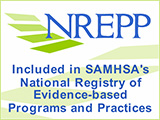 The Community Advocacy Project is considered to be an evidence-based program. In order to confidently state that your program replicates CAP, it is important to be able to document that your intervention adheres to the important philosophies and practices of CAP that have led to its effectiveness.
The Community Advocacy Project is considered to be an evidence-based program. In order to confidently state that your program replicates CAP, it is important to be able to document that your intervention adheres to the important philosophies and practices of CAP that have led to its effectiveness.
Program fidelity refers to the extent to which a program is consistent with the original program model on which it is based. It is to be expected that no two programs will be absolutely identical, and some changes that occur across settings are understandable and necessary (such as whether a program uses volunteers, interns, or paid staff as advocates). Other components, however, must not be modified if you intend to refer your program as an example of The Community Advocacy Project. These are the components that have been determined to be critical to the program’s success.
A simple, easy-to-use fidelity instrument has been created to help you examine the extent to which your program is following the CAP model. The survey, completed anonymously by clients after they have finished your program, will help you measure the following critical program components:
- Length and intensity of the intervention – CAP was designed to be short-term (approximately 10 weeks) but intensive (4-6 hours a week)
- The extent to which the advocate:
- Was aware of community resources and how to access them;
- Encouraged the survivor’s autonomy;
- Was supportive and respectful;
- Helped the survivor with any need the survivor identified as being important;
- Actively worked with the survivor in her community to obtain resources
The survey also includes questions to help you examine the outcomes (or change) that occurred as a result of the intervention. You will be able to examine the extent to which survivors reported:
- Increased knowledge about how to access resources
- Increased self-efficacy (or confidence in her ability to access resources on her own); and
- Satisfaction with the program.
An example of how the fidelity survey can be used to improve your program can be found here. The fidelity surveys are available at no charge to those who have successfully completed the Community Advocacy Project training. Please go to Implement CAP for more information.
Latest News

CAP Disseminated in Monterrey, Mexico
With funding provided by the United States Agency for International …Read More »
Examining the Impact of Mobile Advocacy and Flexible Funding on Domestic Violence Survivors’ Housing Stability and Well-being
Dr. Cris Sullivan, who originally developed the Community Advocacy Project …Read More »
Developed by:
Director, MSU Research Consortium on Gender-based Violence
Professor, Ecological/Community Psychology
Michigan State University


